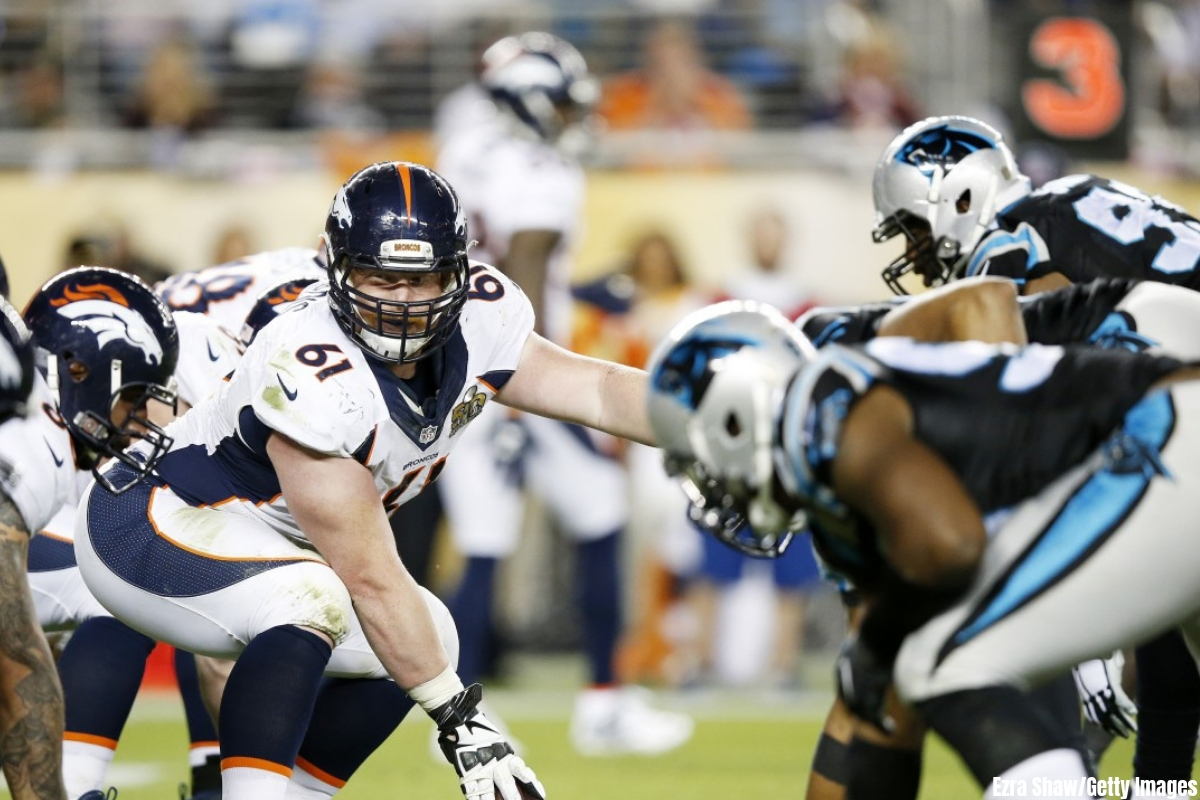It has been a very, very long time since anybody other than Ryan Kalil entered training camp as the Panthers’ starting center, but when the elder Kalil announced a little less than a year ago that the 2018 season would be his last, it was clear that there would be a new man in town for 2019. While the Panthers didn’t enter free agency with the fullest of salary cap coffers, they have signed former Denver center Matt Paradis to a three-year deal worth a reported $27m, and while they did so knowing he is coming off a fractured fibula, it is expected that he will be fully healed by training camp and is the expected Week 1 starter.
So how good is Paradis, what does he offer the Panthers and where could he stand to improve?
Pass Protection
A major reason why the Panthers felt it necessary to look to improve upon their offensive line this offseason was the amount of pressure Cam Newton has faced on a consistent basis – over the last three seasons in particular. It is no coincidence then that the center the Panthers have targeted is a good pass protector:
However, it is worth examining what Paradis does that makes him an asset as a pass protector, as well as one area in which he might improve even further. One thing that should be clear from the above play is the value of good hand placement, and this is something that Paradis consistently does well, locating his hands inside the frame of the defender:
This is made more valuable in combination with his ability to use his feet to keep his arms roughly in line with his center-of-mass, allowing him to keep his arms straight and preventing defenders from pivoting around him:
The quality of his hand placement is made clear on the following play, where his foot gets trodden on, but he is still able to maintain some degree of his blocker without giving a way a penalty due to the inside location he gets his hands:
He also does a good job of combatting the hand usage of defenders, showing good hand speed and coordination to fight through to the frame of the defender:
However, he does have a tendency to swing his arms around from the snap, often leading to him grabbing around the shoulders of defenders who look to make early contact:
This was of even greater relevance to his run blocking – something that I will come to later – but this is going to run the risk of giving away penalties if it continues. Additionally, this meant that his arms were often not in line with his center of mass, making him vulnerable to lateral moves where he was unable to keep himself in position using inside leverage, thereby ceding an advantage to the defender:
This, again, increases the risk of being called for a hold, but also makes him more vulnerable to swim moves:
This isn’t the end of the world, and the fact that he has been able to be a consistently good pass protector to this point in his career likely means that it is not something that should be a major problem all of a sudden in 2019. As mentioned briefly above, another important part of his pass protection is his footwork – while this is less important for centers than it is for tackles, his able to move laterally allowed him to force defenders wide of the pocket:
And made it possible for him to react effectively to rushers coming inside on stunts, such as on the following play:
This goes hand-in-hand with his balance, as this allowed him to recover to pass rushing moves in a way that very few offensive linemen can:
Most centers would have ended that play face down on the floor. It also allowed him to be effective in guiding defenders away from the play, such as on this rollout:
The only criticism of him in this regard is his slight tendency to straighten his legs to counter power rushers – this can lead to him getting jacked up if he is unable to win the pad level battle:
Despite this, Paradis generally fared well against power rushers, keeping his pad level low and allowing him to negate any strength advantage the defender might have:
But, when he did lose the initial pad level battle, nose tackles were able to drive him backward towards the quarterback:
This is something of particular relevance when facing 3-4 defenses, as here Paradis will often be tasked with blocking the nose tackle, with the biggest improvement he could make being to bend more with his knees and less with his waist, giving the same effect in terms of pad level, but making it harder to drive him upward if this initial battle is lost.
The mental side of pass protection should also not be ignored, and this was another area where Paradis impressed, showing a good ability to recognize defensive formations and set protections accordingly:
He also did well in identifying twists and where to help:
Though, of course, nobody’s perfect – especially on the offensive line where you’re only as good as your worst rep:
What was encouraging to see, was that when he wasn’t able to adjust in time, rather than looking to chase a lost cause, he worked to give the quarterback space to avoid the defender:
While it is not exactly a core part of pass protection, he did show the ability to move well in space:
In short, Paradis isn’t perfect as a pass protector, but he does a lot of things well and does them consistently – while there are weaknesses for defenders to try and exploit, his balance and agility allows for him to recover from most mistakes; the potential holds that might derive from his wide arms post-snap are things than can be eliminated with continued coaching. He might not be an All-Pro, but he almost certainly offers an improvement in pass protection over what was already on the Panthers’ roster and, quite frankly, what Ryan Kalil has been able to provide in the last couple of years of his career.
Up Next: Run Blocking



